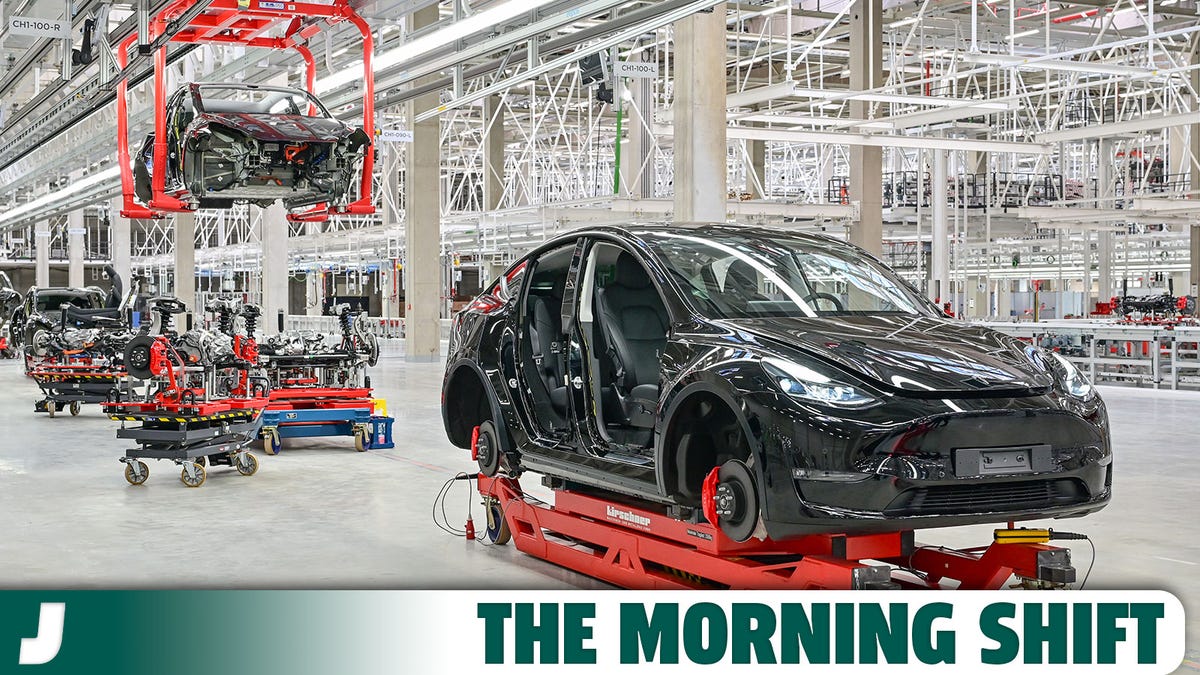Good morning! It’s Wednesday, October 11, 2023, and this is The Morning Shift, your daily roundup of the top automotive headlines from around the world, in one place. Here are the important stories you need to know.
1st Gear: Tesla Says Everything Is Fine
American electric vehicle maker Tesla is coming under fire in Europe after workers at its German plant alleged that it wasn’t meeting workplace safety standards at its factory. Now, the company has dismissed these claims, saying that it undergoes regular inspections at the German factory to ensure health and safety measures are being “respected.”
Tesla’s rebuttal of the claims came in a new report from Reuters, which outlined some of the issues workers at the factory near Berlin had reported. According to the site:
The U.S. electric vehicle maker came under scrutiny in the past fortnight after German media citing local authority documents in Brandenburg reported an unusually high number of work-related accidents requiring workers to take at least three days of sick leave were occurring at the plant, which employs around 11,000 workers.
The report detailed accidents that included serious injuries such as burns, hydrochloric acid or amputated limbs.
Reuters spoke to 12 employees at the Berlin factory, and while four said they were “satisfied” with conditions at the site, eight were not. The unsatisfied factory workers cited issues with “pressure” and “speed” as causing the number of accidents and issues that occurred at the facility.
In a statement shared with Reuters, Tesla said that workers were subject to “training on necessary safety measures,” and were provided with the correct protective clothing. The company also said that the site in Germany was subject to “regular checks by local authorities.”
2nd Gear: Ineos Won’t Go All-Electric Anytime Soon
Despite announcing plans to launch a battery-powered variant of its Grenadier off-roader, British automaker Ineos says it doesn’t have plans to go fully electric anytime soon. In an interview with Automotive News, company boss Lynn Calder said other options would always be on the table as there are just some scenarios where batteries don’t work.
The British automaker, which announced plans for a battery-powered Grenadier earlier this year, is a branch of UK chemical giant Ineos. As well as gas-powered models and an EV, the company is also experimenting with hydrogen power for its future models. As Calder told Automotive News:
We aim to build an electric vehicle that is much like the Grenadier, but not a Grenadier. What we want is an extremely off-road capable 4×4, but in zero-emission form. It’s going to be slightly smaller than the Grenadier.
That said, we have been quite vocal about our feeling that having just one solution to make the transition to zero emission is probably not going to be enough. I have said that I think the combustion engine will remain part of the mix for quite some time. Battery-electric isn’t the answer to everything. Yes, it’s an important part of the transition. I’m not anti-battery electric. I think it’s absolutely the right thing to have in the portfolio. But you won’t see me going 100 percent electric.
As such, the company is investigating the use of hydrogen fuel cells in its future models, and has plans to continue using BMW-sourced engines in its gas-powered models.
3rd Gear: China Doubles Car Exports
While American automakers were celebrating marginal gains across their September EV sales, China was out there blowing everyone out the water after doubling exports of “new-energy passenger cars” last month, according to Bloomberg.
In September, Chinese automakers shipped 91,000 clean vehicles abroad, marking an increase of more than 100 percent compared with the same period last year. Bloomberg reports that Tesla was the largest exporter, shipping more than 30,000 models overseas. According to the site:
Much of the remainder were driven by local automakers such as BYD Co. and Shanghai Automotive Industry Corp., the data showed. Shipments of cleaner cars accounted for 25.4% of total passenger car exports.
However, the brakes could be about to slam onto China’s exports, as Europe is launching a probe into sales of Chinese EVs across the bloc. The European Union is investigating subsidies handed out to EV makers in China, which it argues gives companies there a competitive advantage over homegrown automakers.
Depending on the outcome of the investigation, the EU may slam tariffs onto EV imports from China, which Bloomberg reports could come close to the 27.5 percent levy the U.S. places on Chinese-made EVs.
4th Gear: Unifor Reaches Agreement With GM
While the United Auto Workers union continues to picket American sites run by General Motors, Ford and Stellantis, there’s been a dash of good news from across the border in Canada. There, auto workers at GM sites have reached a tentative agreement with the Chevy owner and paused industrial action.
According to the Detroit Free Press, strike action in Canada has been put on hold while members of the Unifor union vote to ratify the new deal. GM and Unifor reached the agreement after just a day of strike action. The Free Press reports:
The deal, which must still be ratified by union members, includes wage increases of about 20% for production workers and 25% for those in skilled trades over the life of the three-year agreement, along with other gains, including reactivation of cost-of-living adjustments and a reduction in the amount of time it takes workers to reach top pay from eight years to four, according to a union news release.
Members of Unifor walked off GM’s Canadian sites after their contract with the automaker expired at 11:59pm on Monday (October 9). Now, they will get their say on the agreement, which will affect more than 4,000 employees at GM-run sites across the country.

